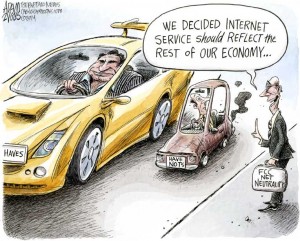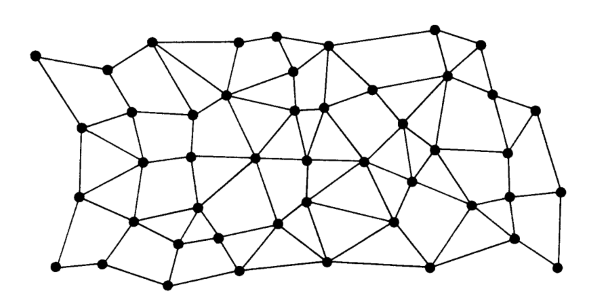aNewDomain — The net neutrality rebellion against the corporate world won hands down earlier this month. More than 4 million people commented on the rules, making this the largest response to any federal request for public comment in history. With a vote on Thursday, February 26, by the FCC we shall see how public opinion may or may not influence the outcome.
 The basic issue of net neutrality is this: Imagine that the water coming out of your tap is less clean than the water at your neighbor’s house because they are paying for premium water. We recognize this as unfair, because public utilities are regulated. People want to get the same service without discrimination, and without preference given to those who pay a premium.
The basic issue of net neutrality is this: Imagine that the water coming out of your tap is less clean than the water at your neighbor’s house because they are paying for premium water. We recognize this as unfair, because public utilities are regulated. People want to get the same service without discrimination, and without preference given to those who pay a premium.
President Heeds Call
As I said in a previous article, President Barack Obama reacted to 3.7 million comments made by Americans to the FCC. His main points were:
- No Blocking
- No Throttling
- Increased Transparency:
- No Fast Lane Deals
Tom Wheeler, chairman of the FCC, followed the President and wrote in Wired:
Using this authority, I am submitting to my colleagues the strongest open internet protections ever proposed by the FCC. These enforceable, bright-line rules will ban paid prioritization, and the blocking and throttling of lawful content and services. I propose to fully apply – for the first time ever – those bright-line rules to mobile broadband. My proposal assures the rights of internet users to go where they want, when they want, and the rights of innovators to introduce new products without asking anyone’s permission.”
Critical Response
The magazine Reason says that secret government intervention is not the way to go, and that President Obama is changing the Internet forever. Reason’s Peter Suderman says, “the proposal is arguably the biggest development in how the government regulates the Internet in almost two decades.” Republican FCC commissioner Ajit Pai, in his statement based on an initial look at the plan, says:
It gives the FCC the power to micromanage virtually every aspect of how the Internet works. It’s an overreach that will let a Washington bureaucracy, and not the American people, decide the future of the online world.”
Sir Tim Berners-Lee, the inventor of the World Wide Web, responds that:
Some companies and governments are arguing that we should depart from the principle of net neutrality. Until now, we’ve largely got along ok without explicit laws to protect net neutrality, but as the Internet evolves, the situation has changed. If we want to maintain and enhance the Internet as an engine for growth, we must ensure that companies providing access should not be able to block, throttle or otherwise restrict legal content and services of their users online, be it for commercial or political motivation. If we don’t explicitly outlaw this, we hand immense power to telcos and online service operators. In effect, they can become gatekeepers – able to handpick winners and the losers in the market and to favor their own sites, services and platforms over those of others.
This is not the last word, as courts will undoubtedly face appeals from Verizon and the Republican congress will do its best to help corporate powers.
For aNewDomain, I’m David Michaelis.
Cartoon: “Net Neutrality” by Adam Zyglis, courtesy of The Buffalo News
Featured Image: Paul Baran’s distributed network architecture, courtesy Cyber Telecom













